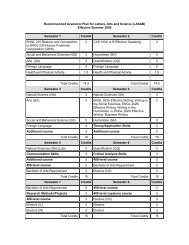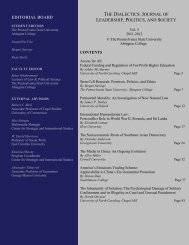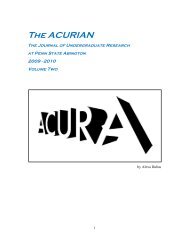Vol. III - Penn State Abington
Vol. III - Penn State Abington
Vol. III - Penn State Abington
Create successful ePaper yourself
Turn your PDF publications into a flip-book with our unique Google optimized e-Paper software.
LEGAL AID CLINICS IN CHINA:<br />
BRIDGING THE DISCONNECT<br />
By Ian Gross ∗<br />
The University of Maryland<br />
College Park<br />
The past thirty years have been marked by tremendous economic progress in China.<br />
Unfortunately, that economic progress has not been matched politically or socially. In terms of<br />
socio-political standards, China is not a rule of law nation. The United <strong>State</strong>s could stand to<br />
benefit from a stronger rule of law climate in China. The question then becomes “how” How<br />
does one nation go about improving the rule of law in another Unfortunately, there is no quick<br />
fix. One of the ways the United <strong>State</strong>s can accomplish this goal indirectly is to support university<br />
legal aid clinics. By providing additional funding to university legal aid clinics, the United <strong>State</strong>s<br />
can hope to ensure that China’s economic rise is accompanied by an adherence to the rule of law<br />
standards.<br />
China’s economic growth numbers are staggering. For most of the decade, the country’s<br />
growth rate in terms of GDP has averaged more than 10% a year (Keidel, 2008). This breakneck<br />
growth is unmatched by any other country during the same period. Even amidst the current<br />
financial crisis, China is still expected to maintain growth, in terms of GDP, in excess of 6% for<br />
this year (Economist Intelligence Unit, 2009). Compare that to the expected negative growth<br />
rates in Europe, the United <strong>State</strong>s, and Central Asia (World Bank, 2009). Should China’s level of<br />
increasing prosperity continue, a reshuffling of the rankings of the most prosperous nations will<br />
occur. By 2035, China will have overtaken the United <strong>State</strong>s as the largest country in terms of<br />
GDP (Keidel, 2008).<br />
Yet, China’s exponential economic growth has failed to give rise to an increased<br />
adherence to international rule of law standards. Rule of law is commonly understood as a legalpolitical<br />
regime that restricts government action while preserving certain individual liberties. In<br />
theory, the rule of law is a system that ensures that the rights of citizens are protected from<br />
arbitrary and abusive use of power from the government (Yu, 2009). Unfortunately, continuing<br />
crackdowns on China’s ethnic minority citizens, ongoing manipulation of the media, and more<br />
severe repression of human rights defenders indicate that China is not a rule of law nation.<br />
Even the Chinese government itself acknowledges this critical shortcoming. In a recently<br />
published White Paper (2008), the Information Office of the <strong>State</strong> Council of the People’s<br />
Republic of China wrote, “The development of democracy and the rule of law still fall short of<br />
the needs of economic and social development.” In other words, the government knows the<br />
country is being hurt by the lack of rule of law.<br />
While the lack of the rule of law in China may not be hurting the United <strong>State</strong>s, the<br />
United <strong>State</strong>s certainly could benefit from a stronger rule of law climate in China. A stronger<br />
rule of law could lead China to become a world power within the existing international<br />
∗ Ian Gross is a junior at the University of Maryland, College Park, with a major in<br />
philosophy and a minor in Chinese language. Upon graduation, he plans to use his<br />
interest in the rule of law to pursue a career in international governance.<br />
THE DIALECTICS ▲ 2009<br />
www.abington.psu.edu/dialectics<br />
14







